It’s hard to deny the importance of piano in today’s music. Rivaled only by guitar, it can be heard in every genre of music, from “normal” genres like jazz to unique uses in everything from EDM and hip-hop.
I humbly believe every musician should have a working knowledge of the piano. Playing piano increases musical opportunities and improves understanding of music theory. Legitimate songs of every level are out there, meaning even a beginner can play real music in a real performance.
But since you’re already reading this article, I’ll assume you don’t need convincing!
The question changes from, “do you want to learn piano?” to, “how do you learn piano?” With the increase of online learning post-COVID, it’s only natural to ask, “can I realistically learn piano online?”
The resounding answer is YES! There are great reasons to learn online, assuming you approach it the right way.
In this article, I explain the advantages of online learning and how to approach it. I will end by listing six piano apps that can greatly benefit your piano journey, following the advice given throughout.
Short on time? Here's my top pick for online piano lessons:
Pianote - Super fun and easy to get started, even for absolute beginners!
You can play along the songs you love and learn at your own pace from a roster of great teachers, ensuring rapid progress. At a very reasonable cost!
For a Professional Piano Career, In-person Learning is the Best
Before focusing on online learning, I need to clarify that in-person lessons are essential for a professional piano career. While I’m not discrediting online learning, you simply cannot replace the experience of in-person, one-on-one lessons.
If you want a career playing piano, understanding every element of the piano is essential.
Fortunately, for many aspiring pianists, they don’t need to know everything about the piano to play it. Like the old adage says, you have to walk before you can run. Pianists must master fundamentals before worrying about other things.
For you, that means online lessons and apps are a perfectly viable option!
Why Learn Piano Online?
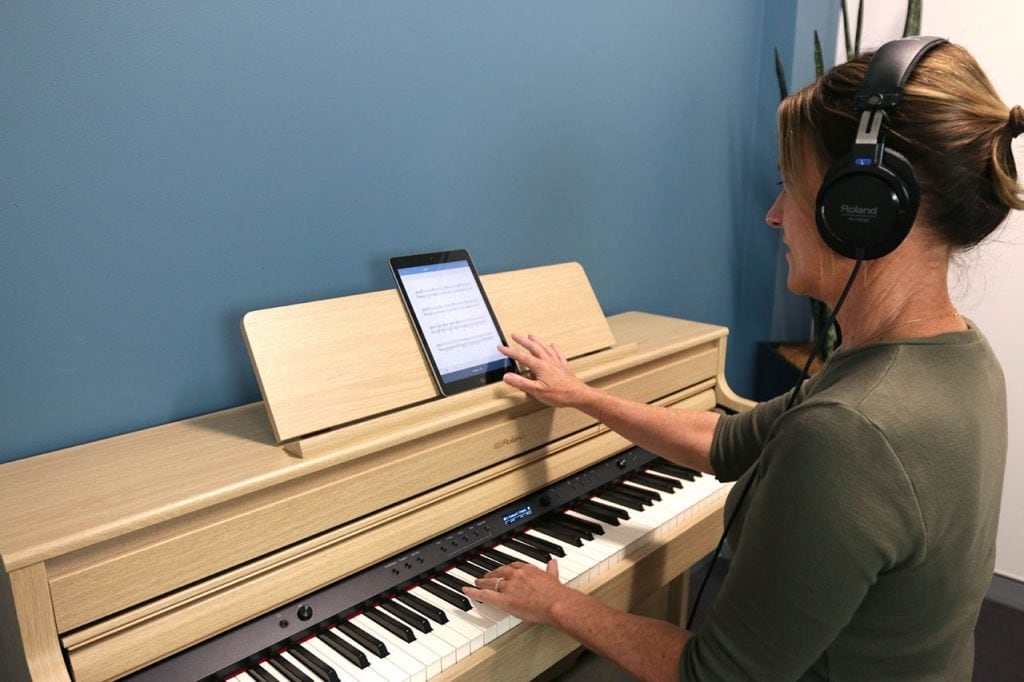
While in-person lessons have many benefits, they also have surprising drawbacks. Traditional lessons use method books, follow the interests of the teacher, and often focus on narrow selections of music.
Effective learning extends far beyond extensive practice and rote memory. As a passionate teacher and learner myself, I’ve seen the detriments of traditional teaching firsthand. More hours don’t guarantee better learning and piles of assignments don’t equal effective practice.
Online learning gets rid of these roadblocks by following a new philosophy called “student-centered learning.” This means that while teachers and apps teach knowledge and skills, students dictate what to learn and how to learn it.
Here are six reasons student-centered learning works well online:
- You have more teachers to choose from. Not everyone has equal access to quality teachers in their geographical areas. Online, however, you can connect with teachers all over the world from anywhere.
- You are in control of your schedule. Driving to lessons takes time. Taking lessons after work can be exhausting. Maybe your only free time is 6 in the morning . . . but who’s teaching at those hours?? Well, online you can set your own hours!
- Most options are cheaper. In-person lessons will usually set you back at least $80 a month. As we will see, online options – even paid ones – tend to be significantly cheaper, or even free!
- You don’t have to read music. Most traditional lessons teach you how to read, then continue from there. Reading is a great skill, but can actually inhibit aural skills and improvisation. By diving into playing first, online lessons get you started faster with both playing and general music skills.
- Online options cater to more learning styles. Traditional lessons focused on visual and logical learning by following carefully regimented sheet music. But some musicians learn completely by ear, while others learn best from videos. Most piano apps take advantage of videos and gamification to help learners internalize information better.
- Online learning forces you to build learning skills. In middle school, I had to take a class called “study skills,” where we literally learned how to learn. Everyone has their own quirks, and knowing your quirks means you know how you learn best.
Online learning puts your learning in your hands, which is the best way to learn. However, this puts more responsibility on you.
First, without a teacher to give feedback, you NEED to go slowly. Learning the most basic skill in a week is better than learning nothing. If you build bad habits by speeding without corrections, those habits will hurt you later.
Second, have a goal to work towards. Traditional classes create theirs for you – it’s called passing the final! But a grade is a poor substitute for a personal dream. Maybe your goal is to learn a specific song, or learn the basics of a certain genre. Whatever it is, make it clear and give yourself a timeframe.
Lastly, listen listen LISTEN! When you don’t have a teacher to explain and correct, your ears become your greatest critics (in a good way!) Don’t just start banging on keys; listen to each song several times and repeat sections as needed before playing yourself. Hum along when you get stuck.
With that advice out of the way, let’s explore some piano apps!
6 of the Best Piano Learning Apps
Pianote

Selling points: pedagogy, abundance of teachers, personalized practicing, basic technology
My top piano app pick has to be Pianote because of its quality organization and features. Learning on your own is great, but it can be very difficult to know what to focus on first since there’s no teacher to tell you what skills to practice first.
All these apps provide a clear roadmap from point A to point B, but none does it quite as smoothly or extensively as Pianote. Their pedagogy, or specific method of going from A to B, develops strategically around your personalized goals.
First, they make you set your long-term goal. From there, they build the fundamentals around the music you’ve chosen. They teach you scales, chords, accompaniment patterns, and riffs before teaching you to read.
From there, they start providing exercises and problem-solving strategies to guide you in how to learn for yourself. They purposely set you up to “outgrow” their course, so that by the end you can learn new music on your own!
You can also focus your attention on specific genres and compositional techniques by watching video lessons by many different musicians. When practicing, you can isolate the piano or have a band jam with you. You can even pick difficult spots and loop them – a very unique feature I would use daily!
As a quick aside, I found out that Pianote is run by the same people at Guitareo, a guitar app whose YouTube channel I watch regularly! Where it gets even better is, when you sign up for Pianote, you get access to all their other platforms (including Guitareo and Drumeo), at no additional cost!
Flowkey

Selling points: teamed with Yamaha, learn any song at any level
Since Yamaha is world-renowned for their piano products, it seems fair to say that teaming up with Flowkey instantly makes the app reputable. It may not be as extensive as the previous two apps, but it certainly excels at what it does feature.
Flowkey’s pedagogical approach varies based on two things: first, your personal goal for piano, and second, the song you would like to learn.
Goals include everything from “playing beautiful piano,” to “playing confidently with both hands.” Once you’ve gotten the goal decided, your song choice gives “meat and bones” to the lessons in between. Like Playground Sessions, it also includes instant feedback.
For those that don’t enjoy figuring out confusing technology, Flowkey could be a great choice. You can plug a digital keyboard into a device, but it can also hear an acoustic piano just fine.
Simply Piano
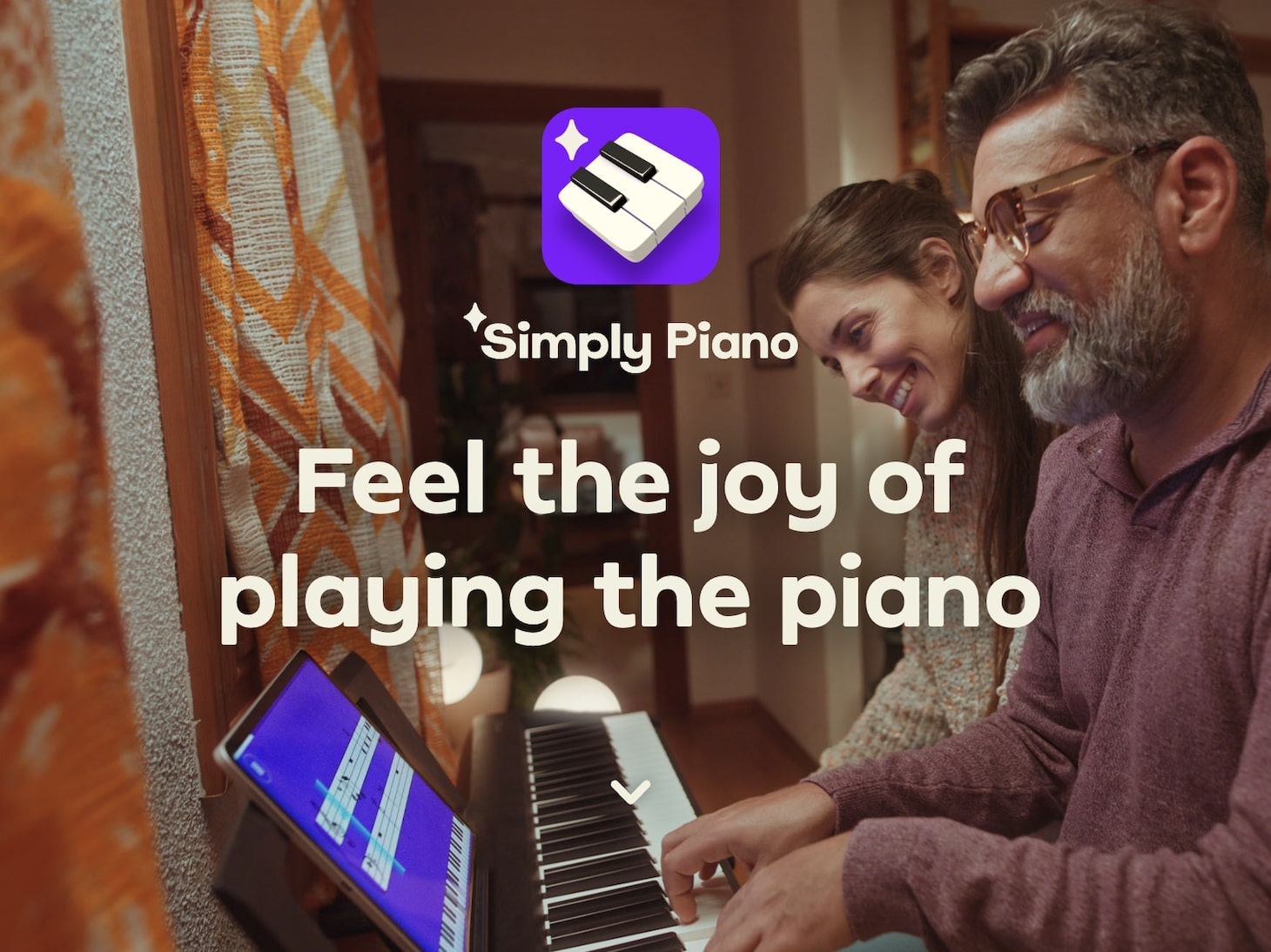
Selling points: Beautiful game-like interface, it accommodates players of all levels
After hitting the 100-million downloads mark, Simply Piano is a piano learning app that you can't give a miss. As its name indicates, this app is aimed at those who don’t want to deal with the intricacies of overcrowded interfaces or too many options.
In that vein, the user interface is game-like and extremely user-friendly. Moreover, the app starts from absolute zero. It even offers a visual in-app keyboard for you to practice if you don’t have a real one.
I tried this feature and, unless you have a big tablet, things feel a little crowded on the screen. Nevertheless, I tried it with my little daughter (6 years old) and she preferred that to my real piano. Also, the absolute beginner, like her, might find the game-like starting exercises more fun to follow than most apps.
As you make progress, you get the chance to practice with slowed-down songs, and the tune library expands. This is great because, as soon as you move to the next level of playability, you unlock new possibilities. In my case, these little milestone achievements were a propelling force moving me forward in my learning path.
Speaking of learning paths, it branches out to “Soloist” and “Chords”. If you want to play classical-oriented material you can choose the first, and if you want to play songs, you can choose the second.
To be absolutely honest with you, I enjoyed both. So, my suggestion is to pursue both directions because the content is different but both offer a great learning experience.
Furthermore, in my humble opinion, knowing about chords makes you a better soloist and vice versa. Plus, I had a lot of fun pursuing both paths.
If you want an app that’s fun and easy to use and that can take you from zero to proficient while keeping you hooked with a step-by-step learning program, you have to check Simply Piano out.
Skoove
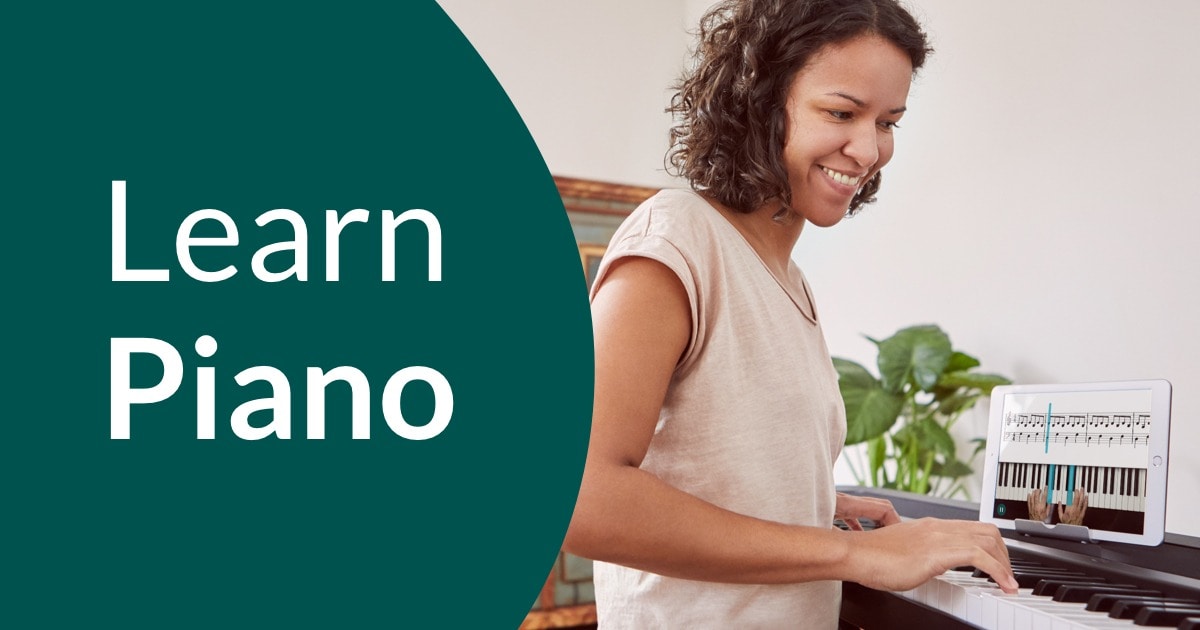
Selling points: technique videos, animated score, focus on listening
If you are an absolute beginner with piano and aren’t seeking to get too advanced, Skoove provides quality content that is both simple yet educational. You still get to choose songs to play, receive instant feedback, and learn theory.
As you learn songs, the score fills the top half of your screen and a video of playing hands fills the bottom. The score scrolls by, allowing you to see the notes highlighted in real time. As far as I know, the other apps don’t go into as much detail covering hand technique.
Lastly, Skoove uses a pedagogical approach called “Listen, Learn, Play.” Their focus on listening means you don’t have to learn to read right away and actually builds skills that will greatly benefit you in the realm of popular music!
Playground Sessions
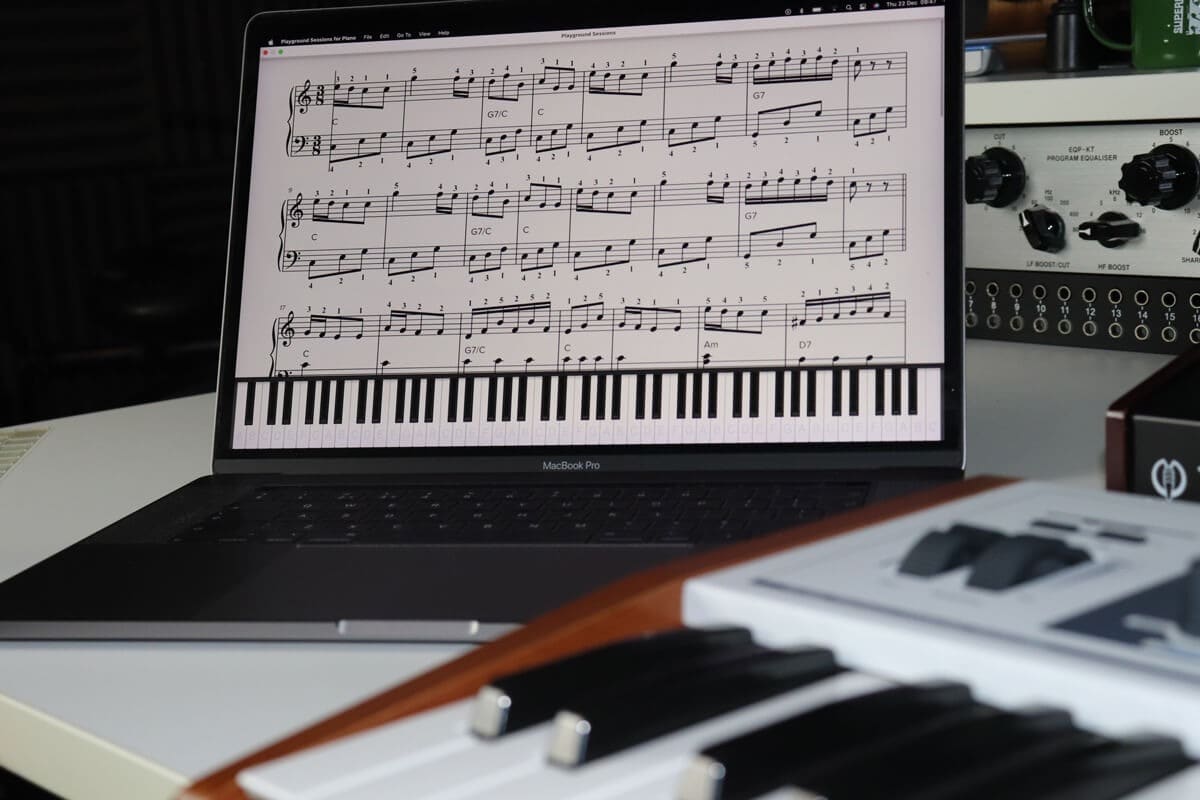
Selling points: co-founded by Quincy Jones, features world-class pianists, gamification
Playground Sessions has the distinction of being co-founded by Michael Jackson’s longtime producer Quincy Jones. Furthermore, some of its teachers have played with David Bowie and Smashing Pumpkins, among others!
Playground Session’s lessons are video-based, with the Bootcamp course focusing on beginners. Each lesson teaches a fundamental concept by pairing it with a popular song. This makes concepts come alive by connecting them with the personal life of learners.
For learners who know the basics, there are additional courses like “Chord Practice” and “Hanon Exercises.”
Sessions’ live feedback feature makes it a strong candidate for those wanting to make sure their playing is spot on. When playing along with your screen, notes will light up green, red, or yellow based on whether you played them correctly or not.
Lastly, Sessions makes use of gamification, which means it treats learning like a competitive computer game. Well-known apps and sites like Duolingo and Hack the Box use gamification to great effect, treating learning like entertainment.
Piano Marvel
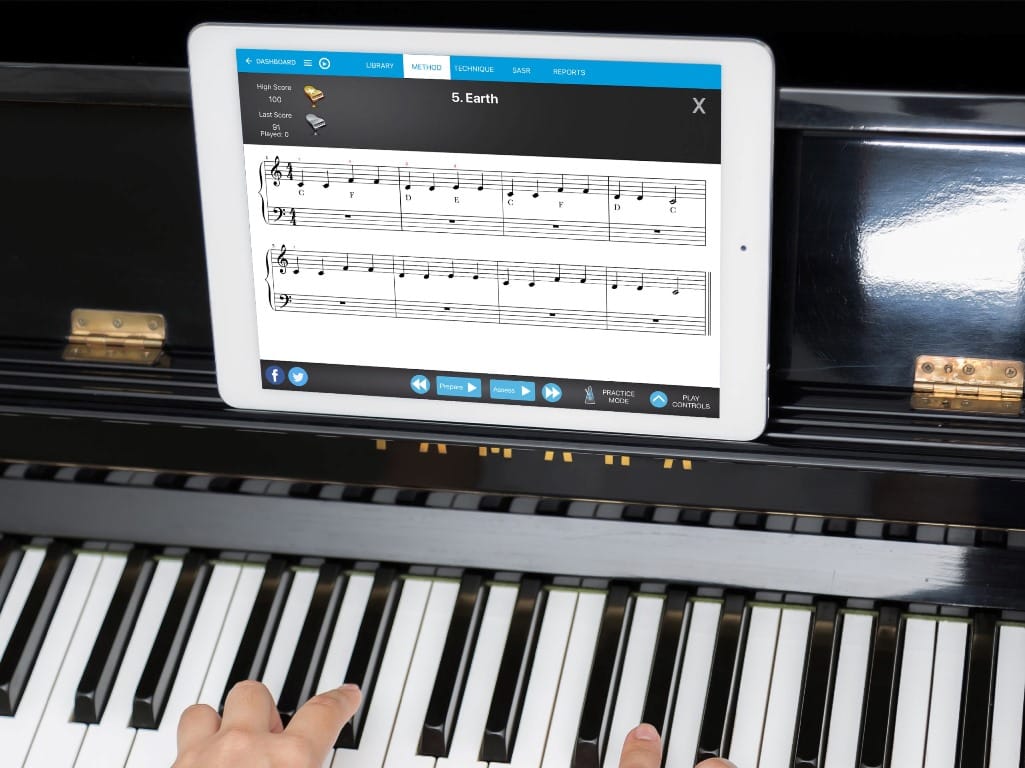
Selling points: organized like a textbook, gamification
If you want to learn piano on your own, but still prefer a more textbook-like approach to learning, Piano Marvel would be the perfect fit for you! Traditional learning methods might have drawbacks, but their format can still be very useful if that is how you learn best.
Piano Marvel lets you choose from a large list of popular songs to play, and teaches you material with written exercises and explanations. You can earn trophies based on how well you play and are graded on how you progress. Of course, you don’t win or lose anything based on these grades, but they can give you feedback on how to improve.
All in all, Piano Marvel’s strengths can be its exact problems, based on how you learn. However, if approaching piano like a student in school helps you, then Piano Marvel certainly fits that bill.
Conclusion
With all the diversity in piano music today, I can guarantee there is a style of piano playing out there just for you. Pair that with all the methods available to learn, and all the teachers out there, I can also guarantee there is a way to learn designed just for you.
So why settle for a method or style you simply don’t enjoy? If you want to be the next Art Tatum virtuoso, then go for it! And if you want to plunk away at steady eighth notes like Paul McCartney in “Hey Jude,” then that’s great too! Whatever it may be, I hope you find a method that works for you. Until next time, enjoy the adventure!


